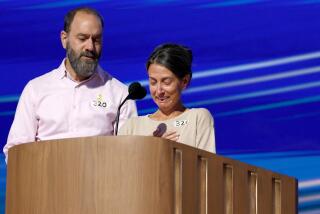2 Former American Hostages Sue Iran : Courts: David Jacobsen and Joseph Cicippio seek $600 million from country they claim sponsored “commercial terrorism.”
- Share via
HUNTINGTON BEACH — Former hostages David P. Jacobsen and Joseph J. Cicippio said they filed a lawsuit Wednesday seeking $600 million of Iran’s frozen assets on the grounds its government sponsored “commercial terrorism.”
“Our lawsuit is significant because it’s a matter of principle more than money,” said Jacobsen of Huntington Beach. “It’s not just Joe Cicippio and I on this. If there are any judgments, we hope to share that with the other ex-hostages.”
The civil suit was filed in U.S. District Court in Washington, their lawyers said.
Jacobsen and Cicippio are unemployed, a status, Jacobsen said, that is common to most ex-hostages.
“There are many people who have misconceptions that we, as ex-hostages, would be too traumatized and brutalized by our ordeal to hold down jobs, when it’s just not true,” he said.
Jacobsen was the director of the American University Hospital at the time he was taken hostage in 1985 and held for 17 months.
Of 500 resumes he sent recently to potential California employers, he said, he got back only half a dozen form letters saying, “thanks but no thanks.”
Jacobsen said that although he has made some money on the lecture circuit, speaking at colleges and corporations, and hopes to give motivational talks to high school students, he has not been able to get his former career on track.
“I scratch out a living in various ways, but have never had an opportunity to resume my career here in Southern California,” he said.
“I got a job in Colorado and I was there for a year and a half but I hated the isolation. Everything I knew and loved was in Southern California--my kids, my grandchildren, the UCLA basketball team and those stupid California Angels. This is my brier patch where I grew up,” Jacobsen added.
Cicippio was working as deputy comptroller of American University in Beirut when he was abducted Sept. 12, 1986. He was released Dec. 2, 1991. His wife, Elham, a Lebanese citizen, is also a plaintiff.
The Cicippios, who live in Princeton, N.J., and Jacobsen are claiming damages for kidnaping, physical abuse, false imprisonment, inhumane medical treatment, loss of job opportunities and pain and suffering.
The lawsuit alleges that Iran kept the hostages in Beirut as leverage to free up some Iranian assets frozen by the President Jimmy Carter’s Administration after the 1979 hostage-taking at the U.S. Embassy in Tehran. That group of hostages was released on Jan. 21, 1981, almost at the same time President Ronald Reagan was being inaugurated. Millions of dollars in frozen assets remain, said Jacobsen’s lawyer, Frank Murphy.
When the hostages from the U.S. Embassy were freed, the United States and Iran agreed to release $10 billion in Iran’s assets that were frozen in accounts outside of the Middle East country.
Jacobsen’s lawyers have said they understand there are still hundreds of millions of dollars left in escrow accounts. The interest has accumulated and the exact amount is unknown, according to his attorneys. But one former Treasury Department official said there is virtually nothing left in the accounts.
A claims tribunal was established in 1980 to resolve claims arising from the 1979 Iranian revolution. During the 1980s, Iran repeatedly demanded the return of the assets before it would intervene on behalf of the hostages in Beirut.
Bush Administration officials have said Iran paid for the hostages’ imprisonment and paid the captors $2 million for each hostage released.
Jacobsen said he was angered when the United States freed $262 million to Iran from its government’s asset accounts, after the releases of Thomas Sutherland, Cicippio and Terry Anderson, the last remaining American hostage who was freed Dec. 4, 1991.
“We know that happened and that means they were guilty of commercial terrorism. We hope that instead of Iran being rewarded for holding hostages or any country for that matter, that whatever funds are allocated will be shared with ex-hostages,” he said.
Because of a U.S.-Iran agreement in 1979, State Department employees who were held as hostage were prohibited from suing for damages against Iran, Jacobsen said.
“Iran got a message that they can grab hostages and be able to do that with impunity. And Joe and I want to tell every country that takes hostages or gets involved in terrorism or kidnaping, that we mean business,” he said.
He and Cicippio also are planning an appeal to President Bush and rival presidential candidates Ross Perot and Bill Clinton to support a “clear-cut” U.S. policy on dealing with reparations to ex-hostages.
“This isn’t vengeance, but we feel we have a commitment to justice that evil people will not be rewarded for their villainy,” he said.
The Associated Press contributed to this story.
More to Read
Sign up for Essential California
The most important California stories and recommendations in your inbox every morning.
You may occasionally receive promotional content from the Los Angeles Times.










